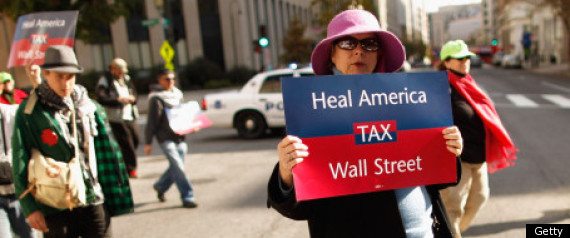 WASHINGTON -- A minuscule tax on financial transactions proposed by congressional Democrats would raise more than $350 billion over the next nine years, according to an analysis by the Joint Tax Committee, a nonpartisan congressional scorekeeping panel.
WASHINGTON -- A minuscule tax on financial transactions proposed by congressional Democrats would raise more than $350 billion over the next nine years, according to an analysis by the Joint Tax Committee, a nonpartisan congressional scorekeeping panel. The analysis was sent Monday to the offices of Sen. Tom Harkin (D-Iowa) and Rep. Peter DeFazio (D-Ore.), the lawmakers who proposed the tax, and provided to The Huffington Post.
The Wall Street Trading and Speculators Tax Act would impose a tax of 0.03 percent on financial transactions, meaning that longterm investors would barely notice it, but traders who move rapidly in and out of positions would feel its sting and, the authors hope, reduce the volume of their speculation in response.
The European Union is pressing forward with a financial transaction tax, though it is encountering some resistance from the United Kingdom, the financial center of Europe.
In order to be effective, the tax would need to be implemented in most major industrial countries where trading is done.
Some believe that the global nature of the Occupy Wall Street movement will boost the chances of the transaction tax being signed into law. While the movement has been criticized for lacking specific demands, protesters have voiced their support for a "meaningful" tax being placed on Wall Street trading.
Specific solutions to economic inequality are not in short supply. What's been missing for years has been the political will to implement them.
"Occupy Wall Street has just reminded a large majority of the American people that our economy was destroyed by gambling on Wall Street. And that the people who destroyed our economy have been amply rewarded and not prosecuted," DeFazio told HuffPost.
The tax would raise $352 billion between January 2013 and December 2021. It faces stiff opposition from congressional Republicans, nearly all of whom have taken a pledge not to support new taxes, as well as ambivalence from some Democrats who rely on Wall Street cash to fund their campaigns.
Origin
Source: Huff
No comments:
Post a Comment